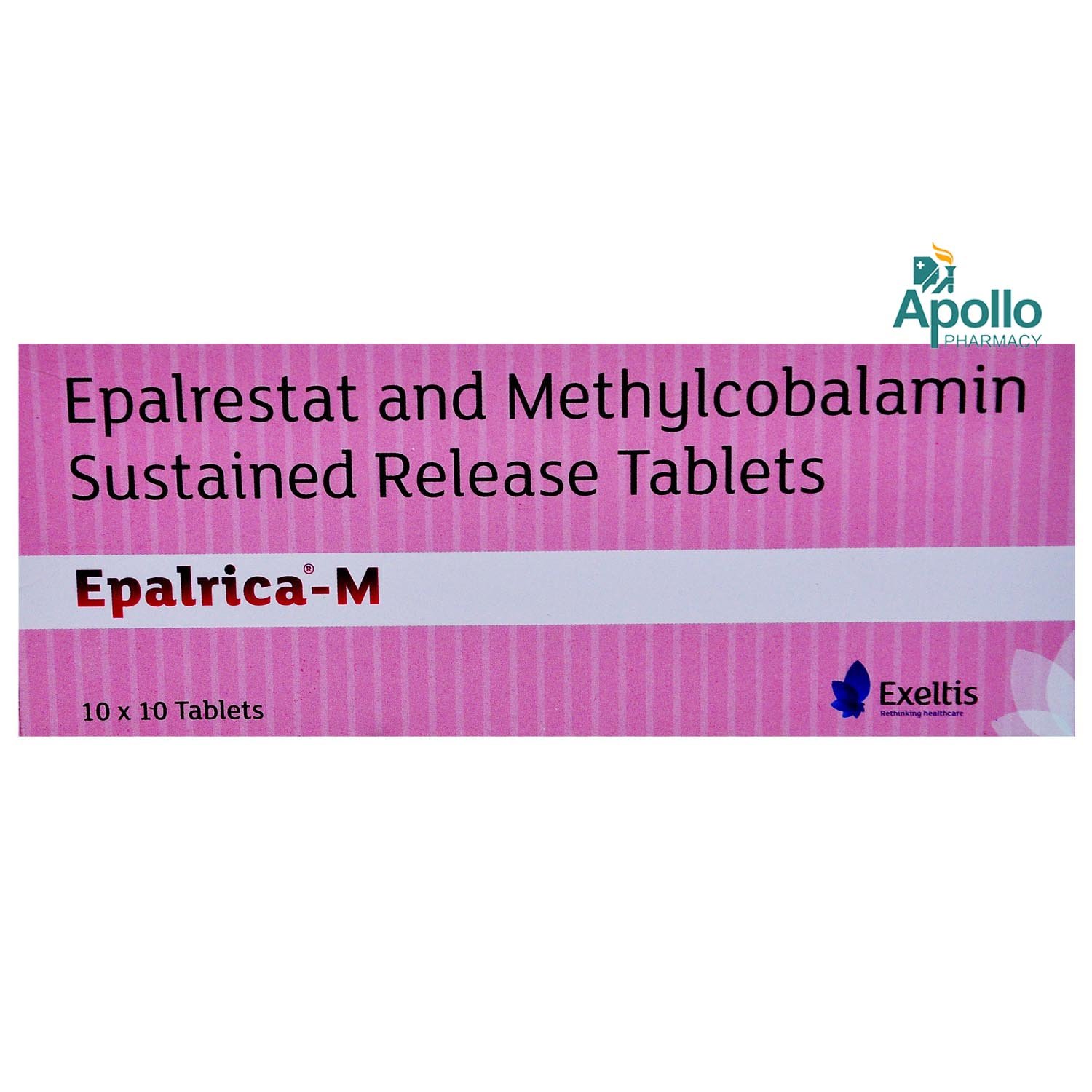Zepler M 150mg/1500mcg Tablet
MRP ₹218
(Inclusive of all Taxes)
₹32.7 Cashback (15%)
Provide Delivery Location
Online payment accepted
 Prescription drug
Prescription drugWhats That
Composition :
Manufacturer/Marketer :
Consume Type :
Return Policy :
About Zepler M 150mg/1500mcg Tablet
Zepler M 150mg/1500mcg Tablet is a combination medicine indicated for the management of diabetic neuropathy. Diabetic neuropathy is a condition in which nerve damage occurs due to high blood glucose levels. It primarily damages the nerves in the legs and feet. Diabetic neuropathic pain is common in patients with type 1 and type 2 diabetes.
Zepler M 150mg/1500mcg Tablet contains Epalrestat and Methylcobalamin. Epalrestat works by inhibiting the aldose reductase enzyme, which catalyses the conversion of glucose to sorbitol, thereby preventing the accumulation of sorbitol. Accumulation of sorbitol occurs due to hyperglycaemia in patients suffering from diabetes which leads to nerve pain. Methylcobalamin helps in the rejuvenation and protection of damaged nerve cells by producing a substance called myelin. Together, Zepler M 150mg/1500mcg Tablet helps in treating diabetic neuropathy.
You are advised to take Zepler M 150mg/1500mcg Tablet for as long as your doctor has prescribed it for you, depending on your medical condition. In some cases, you may experience certain common side effects, such as nausea, vomiting, diarrhoea, dizziness, and headache. Most of these side effects do not require medical attention and will resolve gradually over time. However, you are advised to talk to your doctor if you experience these side effects persistently.
Consult your doctor if you are pregnant or breastfeeding. Zepler M 150mg/1500mcg Tablet may cause drowsiness and dizziness, so drive only if you are alert. Zepler M 150mg/1500mcg Tablet is not recommended for children as safety and effectiveness have not been established. Avoid consuming alcohol with Zepler M 150mg/1500mcg Tablet as it could lead to increased drowsiness and dizziness. Keep your doctor informed about your health condition and medicines to rule out any side effects/interactions.
Uses of Zepler M 150mg/1500mcg Tablet
Directions for Use
Key Benefits
Zepler M 150mg/1500mcg Tablet is a combination of two drugs, namely: Epalrestat and Methylcobalamin. Zepler M 150mg/1500mcg Tablet is indicated for the management of diabetic neuropathy. Epalrestat works by inhibiting the aldose reductase enzyme, which catalyses the conversion of glucose to sorbitol. This prevents the accumulation of sorbitol. Accumulation of sorbitol occurs due to hyperglycaemia in patients suffering from diabetes which leads to nerve pain. Methylcobalamin helps in the rejuvenation and protection of damaged nerve cells by producing a substance called myelin. Together, Zepler M 150mg/1500mcg Tablet helps in treating diabetic neuropathy.
Storage
Drug Warnings
Do not take Zepler M 150mg/1500mcg Tablet if you are allergic to any of its components. Inform your doctor if you have liver or kidney problems. Consult your doctor if you are pregnant or breastfeeding. Zepler M 150mg/1500mcg Tablet may cause drowsiness and dizziness, so drive only if you are alert. Zepler M 150mg/1500mcg Tablet is not recommended for children as safety and effectiveness have not been established. Avoid consuming alcohol with Zepler M 150mg/1500mcg Tablet as it could lead to increased drowsiness and sleepiness.
Diet & Lifestyle Advise
- Include food rich in vitamin B and D in your diet.
- Include cayenne pepper in your diet as it can help in lowering neuropathic pain.
- Exercising regularly helps in improving overall health and combating pain.
- Rest well, get plenty of sleep.
- Try taking a warm bath as it can be soothing.
- Avoid smoking and alcohol consumption.
- Meditation and yoga can help lower stress, decrease pain sensitivity and improves coping skills.
- Acupuncture can be helpful by stimulating pressure points.
- Using essential oils for massages can help increase circulation.
Side Effects of Zepler M 150mg/1500mcg Tablet
- Dizziness
- Nausea
- Vomiting
- Headache
- Diarrhoea
Habit Forming
Therapeutic Class
All Substitutes & Brand Comparisons
RX
Out of StockMepal 150mg/1500mcg Tablet
₹143
(₹12.87 per unit)
34% CHEAPERRX
Alrista Plus Tablet 10's
Macleods Pharmaceuticals Ltd
₹235
(₹21.15 per unit)
7% COSTLIERRX
Epineuron SR Tablet 10's
Aristo Pharmaceuticals Pvt Ltd
₹236
(₹21.24 per unit)
8% COSTLIER
Author Details
We provide you with authentic, trustworthy and relevant information
FAQs
Drug-Drug Interactions Checker List
- CHLORAMPHENICOL
- METFORMIN
Disease/Condition Glossary
Diabetic neuropathy: Diabetic neuropathy is a condition in which nerve damage occurs due to high blood glucose levels. It mostly damages the nerves in the legs and feet. Diabetic neuropathic pain is common in patients with type1 and type2 diabetes, which usually develops slowly. The pain could be intermittent or continuous, which is felt as a prickling, stabbing, tingling or burning sensation. A feeling of numbness and loss of sensations is also common with neuropathic pain. Symptoms include spontaneous, untriggered pain, unpleasant feeling, shooting, burning or stabbing pain, difficulty with coordination when walking, difficulty resting or sleeping, and evoked pain (pain caused by events that are usually not painful).

Have a query?
Alcohol
Safe if prescribed
Avoid consumption of alcohol while taking Zepler M 150mg/1500mcg Tablet as it may cause increased dizziness.
Pregnancy
Consult your doctor
Please consult your doctor if you have any concerns regarding this; your doctor will prescribe only if the benefits outweigh the risks.
Breast Feeding
Consult your doctor
Consult your doctor before taking Zepler M 150mg/1500mcg Tablet; your doctor will decide whether Zepler M 150mg/1500mcg Tablet can be taken by breastfeeding mothers or not.
Driving
Safe if prescribed
Zepler M 150mg/1500mcg Tablet may cause dizziness. Do not drive or operate machinery unless you are alert.
Liver
Consult your doctor
Limited information is available regarding the use of Zepler M 150mg/1500mcg Tablet in patients with liver disease. Please consult your doctor.
Kidney
Consult your doctor
Limited information is available regarding the use of Zepler M 150mg/1500mcg Tablet in patients with kidney impairment. Please consult your doctor.
Children
Safe if prescribed
Zepler M 150mg/1500mcg Tablet should not be given to children as safety and efficacy have not been established.










_0.jpg?tr=q-85)

